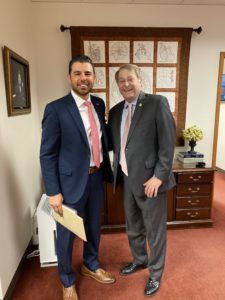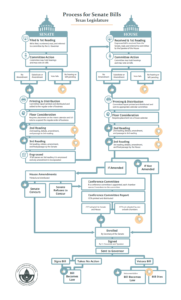Greetings from your Texas Capitol! To put it simply, we are now deep in the throes of the legislative session. The House and Senate are passing bills in our respective chambers and working these pieces of legislation across the Capitol in our best efforts to get good bills sent to Governor Abbott’s desk and ultimately signed into law. Let’s dive in!
Texas Senate Unanimously Passes State Budget
Last week, the Texas Senate unanimously passed CSSB 1, the 2022-23 biennial state budget. I applaud the work of each of the Senate Finance Committee members and the outstanding leadership of chairwoman, Jane Nelson (R-Flower Mound), who appropriately called this budget a “responsible budget that meets the needs of our growing state — a testament to our resiliency after the year we just endured. Through hurricanes, recessions, and natural disasters, we have proven time and time again that no one should ever underestimate Texas.”
CSSB 1 appropriates $250.7 billion in All Funds and $117.9 billion in General Revenue for the FY 2022-23 biennium. This represents 2.6 percent growth in General Revenue and is well under the population and inflation growth caps. Highlights of CSSB 1 include:
- Funding for the full Foundation School Program entitlement, reflecting changes made last session to the school finance formula, including:
-
- $3.1 billion to fund enrollment growth for public education; and
- $1 billion in additional state aid related to property tax compression in the 2022-23 biennium;
- Continues reforms to the Teacher Retirement System passed the last session through SB 12 to ensure the retirement fund remains actuarially sound for current and future retirees;
- $8.1 billion to maintain higher education institution formulas, including full funding for Texas State Technical Colleges returned value formula;
- An additional $57 million to maintain financial aid programs at the Texas Higher Education Coordinating Board;
- $199 million for Graduate Medical Education to meet the 1.1 to 1 ratio of first-year residency positions for each Texas medical school graduate;
- Combined projected funding of $8.1 billion for mental health across 25 state agencies, including:
- over $87 million to bring additional state hospital beds online;
- $30 million for new rural and urban community mental health beds;
- an increase of $19.5 million to maintain operations for the Texas Child Mental Health Care Consortium; and
- over $1 million in new funding for Senator Nelson’s SB 64, to create a peer-to-peer counseling network and increase access to licensed mental health providers for Texas Law Enforcement Officers;
- $352.6 million, an increase of $10.2 million, for women’s health programs, including the continuation of the Healthy Texas Women program’s enhanced post-partum care services implemented by the Legislature last session;
- Lower target caseloads for conservatorship workers at Child Protective Services by adding $20.1M specifically for conservatorship workers;
- $44.5 million to expand Community Based Foster Care beyond catchment areas approved last session;
- An additional $8 million for Children’s Advocacy Centers and $7.5 million for family violence shelters that have been significantly impacted by COVID-19;
- $34.4 million to support Rape Crisis Centers, an increase of $4.7 million from the budget as filed, to provide mental health counseling and to address waitlists;
- $128.5 million to fund Department of Public Safety Crime Lab services, including maintaining prioritization and timely testing of sexual assault kits;
- $34 million to provide a 3 percent pay increase to Department of Criminal Justice correctional officers working in maximum security units;
- Maintains our heightened security commitments along our Southern border with Mexico;
- $1.2 billion to address cybersecurity, replace old technology systems and upgrade information technology at State Agencies;
- Restores the 5% reduction from the previous biennium funding levels for Texas food banks and home-delivered meal programs;
- 100 percent appropriation of estimated available Sporting Goods Sales Tax, totaling over $400 million, to support state parks and historical sites;
- Additional staff resources to enhance the Public Utility Commission’s oversight of ERCOT activities; and
- Over $30 billion to address the state’s transportation needs, including $26 billion dedicated for highway planning, design, construction, and maintenance.
I am personally proud that funding for Texas State Technical College (TSTC) will continue to be based on the formula agreement that the Legislature made with them three sessions ago. TSTC is funded differently from all other higher education institutions because they are funded based on results, not activity. I am pleased that the budget recognizes this funding agreement by funding TSTC based on the overwhelming success of students graduating and being employed quickly in the Texas Economy. TSTC is a huge asset to the State of Texas, and I’m always proud to advocate on their behalf.
Now that the budget (CSSB 1) has passed the Senate, it will go to the House. The House will pass their budget, and then the bill’s final version will be debated and shaped through a conference committee—a policy working group comprised of five representatives and five senators. It will then return to both chambers for one final vote of approval.
Election Integrity Bill Passes the Senate (SB 7)
The Texas Senate passed much-needed election reforms. Senate Bill 7 by Senator Bryan Hughes (R-Mineola) was sent to the Texas House and, if enacted, will ensure our election laws are uniformly executed, and many of the election violations currently taking place will end. SB 7 seeks to address the issues surrounding election crimes by strengthening poll watcher protection, requiring a voter-verifiable paper trail, and providing more timely evidence in investigations relating to alleged voter fraud. SB 7 brings further transparency to the election process by utilizing technology to track applications and ballots by mail electronically. Additionally, it authorizes a video surveillance system in all areas containing voted ballots and provides this footage to the public via livestream. SB 7 limits the most common fraudulent practices by prohibiting the solicitation of early voting ballots as well as the distribution of early voting applications to individuals who did not request an application. SB 7 helps ensure that every eligible voter can vote and that their vote’s counted accurately and that they know it’s counted accurately. Texans sought reform, and Senate Bill 7 will make it easier to vote and hard to cheat. Lt. Gov. Dan Patrick did a press conference to combat the egregious inaccuracies reported about this legislation. You can watch that press conference by clicking this link.
Texas Senate Passes Pro-Life Legislation (SB 8, SB 9, and SB 1173)
- SB 8 (Hughes) – SB 8 requires a physician to check for a fetal heartbeat before performing an abortion. If a heartbeat is detected, this bill will prohibit an abortion from moving forward. SB 8 creates civil liability for those who aid in the performance or inducement of an abortion after a heartbeat is detected. This bill outlines an exemption for medical emergencies, in which case an abortion may be necessary to save the mother’s life.
- SB 9 (Paxton) – The goal of SB 9 is to end the practice of abortion in Texas in the event that the Supreme Court reverses its rulings under Roe v. Wade and Planned Parenthood v. Casey. If overturned, abortion law-making authority would return to the state. This bill ensures that if this happens, Texas has a mechanism in place to stop this practice as soon as possible. Under SB 9, anyone who performs, induces, or attempts to perform an abortion in Texas will have committed a felony offense in the second degree. However, if this performance results in the unborn child’s death, the individual will have committed a felony in the first degree. This bill outlines an exemption for medical emergencies, in which case an abortion may be necessary to save the mother’s life.
- SB 1173 (Hancock) – SB 1173 requires that perinatal palliative care (end-of-life care for unborn children who are not expected to survive outside the womb) information be provided to pregnant women at the time of diagnosis of severe fetal disability, so the woman makes a fully informed decision regarding her pregnancy. It also prohibits discriminatory abortion based on race, ethnicity, sex, probability of having or confirmed diagnosis of Down syndrome, or probability of having or confirmed diagnosis of a disability.
Star-Spangled Banner Protection Act (SB 4) Passes the Senate
Last week, the Texas Senate passed SB 4 by Sen. Dawn Buckingham (R-Lakeway), ensuring that the national anthem shall play before each professional sports game played at or in a taxpayer-supported venue. For too long, sports teams have used taxpayer-supported venues to advance social protests, many of which appear anti-American. As I said on the Senate floor when I spoke on the bill, this legislation is not about sports games; this is about what generations of servicemen and women have endured and will endure in the fight for our liberties. We must continue to honor those who gave us the gift of this beautiful nation. Texans are patriotic people who expect reverence and honor to be given to our veterans and this nation, and I believe this bill does that, and I am proud to be a co-author.
Senate Bill 742 Passes the Senate
Last year, I was approached by a friend and constituent, Kary Lalani, a Waco hotelier in District 22, about an issue he was having with his property taxes. As you can imagine, the COVID-19 pandemic severely impacted countless businesses throughout the state. During most disasters, Texas law makes provision to alleviate the economic devastation that accompanies the physical destruction brought on by disasters. One such example lies in Chapter 31 of the Tax Code, which permits a business that “has been damaged as a direct result of [a] disaster” to pay its ad valorem taxes in installments. Unfortunately, Kary reported that he and many business owners were having difficulty with taxing units unwilling to authorize installment payment plans for their property taxes, even though their businesses were adversely affected by COVID-19. Purportedly, they were not eligible for these plans because the pandemic did not cause actual physical damage to the businesses’ property. SB 742 bridges this gap by amending Chapter 31 so that installment plans are available for businesses in disaster areas even if those businesses have not been damaged as a direct result of the disaster. Given the difficulty in evaluating the negative impacts incurred from nonphysical, economic damage (such as the type of damage suffered under COVID-19), SB 742 affords taxing units case-by-case discretion on approving installment payments in these scenarios. I want to thank Kary Lalani for working with me on this legislation, and now I look forward to my colleague Rep. Doc Anderson getting this through the House of Representatives.

Pictured with Kary Lalani, a hotelier from Senate District 22, who came to Austin to testify in support of SB 742.
Tracking Legislation
In the final two months of a session, bills move more and more rapidly through the Legislature. Because my staff frequently receive calls at the Capitol and District offices asking about the status of specific bills or issues, we wanted to share this helpful infographic outlining what can sometimes be a convoluted process. While swift at times, this process is purposefully transparent, and I think it’s essential for citizens to follow along 24/7. Everything outlined in this chart can be found at https://capitol.texas.gov/. I hope this is helpful!

As always, I hope our Capitol Update is informative and that you’ll share it with your friends, family, and colleagues in Senate District 22, who may subscribe to the Capitol Update by clicking here. You can follow us on Parler or keep in touch with legislative happenings via https://capitol.texas.gov/.
God bless,

Brian Birdwell
State Senator, District 22
Austin: (512) 463-0122 // Waco: (254) 776-6225 // Granbury: (817) 573-9622
[email protected] // www.senate.texas.gov
